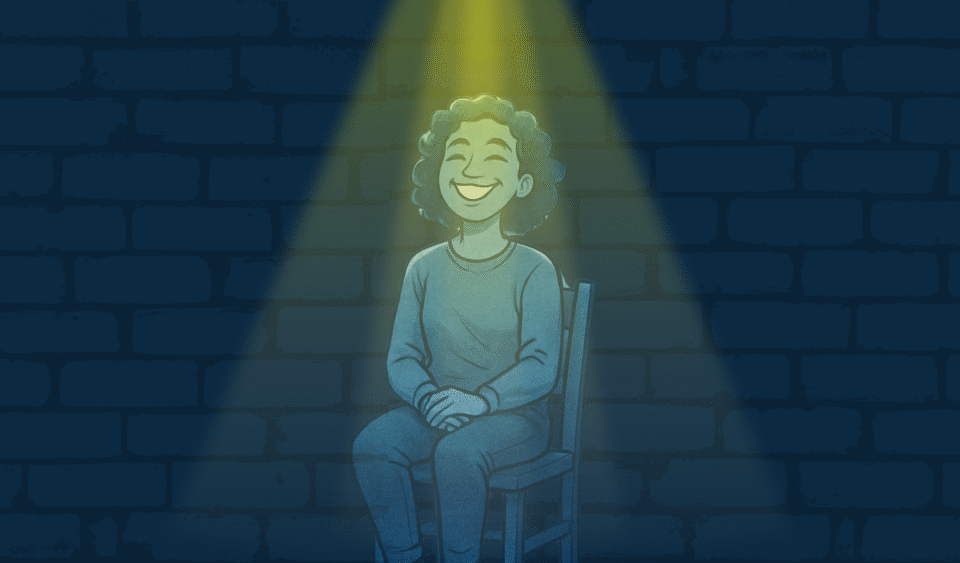Most people live afraid.
You can see it in how they hold back in meetings. In how they dress just a little safer than they want to. In the opinions they swallow. In the dreams they don’t talk about.
Afraid of judgment. Of disapproval. Of standing out.
Look around. Normal people filming themselves crying in cars. Recording mundane thoughts. Documenting “vulnerable moments” that look suspiciously staged. Constantly performing rather than living.
It’s exhausting to witness. Imagine how draining it is to actually live that way.
The Performance vs. Real Life
People edit themselves in real time. Measuring words before they leave their mouths. Adjusting appearances based on who might see them. Calculating the risks of showing who they actually are.
And you have to wonder who they might become if they stopped performing.
Not if they stopped caring about others – that’s not the point. But if they stopped allowing potential judgments to dictate their choices.
Caring But Not Giving a Fuck
There’s a critical distinction most miss. Caring about others doesn’t mean surrendering autonomy to their opinions.
Caring deeply what someone thinks. But not giving a fuck if they don’t like your shirt.
Caring about their feelings. But not giving a fuck if they disagree with your choices.
Caring about their perspective. But not giving a fuck if they think you’re doing it wrong.
This needs explaining.
Caring means recognizing another’s humanity. Valuing their experience. Wanting good things for them. Being willing to listen. Considering how actions might impact them.
But not giving a fuck means not abandoning yourself to win approval. Not twisting into shapes that don’t fit. Not silencing your voice to make others comfortable. Not dimming your light to avoid outshining anyone.
As long as you’re not harming others, as long as you’re moving toward what matters, their approval of your path is not required.
This isn’t selfish.
It’s the prerequisite for offering anything genuine to the world.
The Invisible Prison
Most people live inside invisible cages. The walls are made of imagined judgments – most of which will never actually happen. They make decisions based not on what they want, but on avoiding potential criticism.
“What will people think if I change careers now?” “What will they say if I post this opinion?” “How will I be judged if I admit I don’t know?”
The tragedy isn’t just that these fears limit what someone will try. It’s that they corrupt who they become.
When the primary driver is avoiding judgment rather than pursuing what matters, people slowly transform into hollow versions of themselves – molded by others’ expectations.
That’s not living. That’s existing in a constant state of defense.
Social Media Made It Worse
The platforms are literally designed to trigger the need for validation and fear of rejection.
Every post becomes a referendum on worth. Every lacking engagement becomes evidence of inadequacy. Every comment becomes potential ammunition.
And so people adapt – not by developing resilience, but by becoming ever more performative. They don’t post what they actually think or care about. They post what they think will get positive response. They manufacture emotions for strangers.
It’s pathetic when influencers do it for cash. It’s tragic when regular people do it for free.
The Power of Selective Caring
The alternative isn’t becoming an asshole who disregards everyone. It’s selective caring.
Caring deeply about the important things – the people who matter, the values held, the work that fulfills. And simultaneously releasing attachment to judgment about everything else.
This is where true power lives. When someone can say:
“I value your humanity, but your opinion of my choices is none of my business.” “I respect your perspective, but I don’t need your approval.” “I care about you, but I don’t answer to you.”
This mindset isn’t arrogance. It’s the prerequisite for authenticity.
The Empty Promise
No amount of performance will ever make everyone like you.
No matter how carefully someone curates their presence, how meticulously they craft their words, how vigilantly they monitor their actions – some people will still dislike them, disagree with them, or misunderstand them.
Trying to please everyone isn’t just impossible. It’s soul-destroying.
The energy spent managing perceptions is energy stolen from actually living. From creating work that matters. From building meaningful relationships. From pursuing what genuinely lights you up.
And for what? To avoid criticism that will come anyway? To earn approval from people whose opinions won’t matter in five years?
What a fucking waste.
Breaking Free
Liberation starts with a simple but confronting question: “Whose opinion am I adjusting my behavior for right now?”
When that hesitation comes before speaking your mind, ask it. When finding yourself dressing for others rather than yourself, ask it. When choosing to stay silent rather than risk disagreement, ask it.
Then follow with an even more uncomfortable question: “Is their opinion actually relevant to what matters to me?”
Most of the time, the honest answer is no.
A colleague’s view on your career change doesn’t matter. A stranger’s opinion about your creative work doesn’t matter. A neighbor’s judgment of your lifestyle doesn’t matter.
The only opinions that deserve consideration are from people who:
- Actually understand the context of your choices
- Have genuine care for your wellbeing
- Have earned the right to speak into your life
- Have relevant wisdom or experience to offer
Everyone else?
Their opinions are just noise.
The Mind-Bending Truth
When people stop performing for approval, they often gain more genuine connection.
Others are drawn to authenticity, even when they disagree with it. They respect conviction, even when it differs from their own. They trust consistency, even when it’s not what they would choose.
The most magnetic quality isn’t perfection or agreeability. It’s self-trust. The palpable sense that someone moves through the world guided by their own compass rather than the weathervane of public opinion.
You can still be kind, considerate, and open to feedback. But do it from a place of choice rather than fear. Of generosity rather than need. Of genuine care rather than performance.
Starting The Journey
This mindset isn’t achieved through affirmations or overnight transformation. It’s built through deliberate practice:
- Start small – Choose one area of life where you’ll stop adjusting for others’ opinions. Your clothing. Your hobbies. Your reading choices.
- Notice the impulse – Before you can change the habit of seeking approval, you must become aware of when it happens. The moment you feel yourself shifting to please others, pause and name it.
- Question the relevance – Ask whether this person’s opinion actually matters to what you value. Not in a dismissive way, but in an honest assessment of its relevance.
- Redirect the energy – Every time you catch yourself performing, consciously shift that energy toward what actually matters to you.
- Expect discomfort – The first times you choose authenticity over approval will feel wrong. Your nervous system is accustomed to the safety of conformity. The discomfort doesn’t mean you’re making a mistake. It means you’re reclaiming your autonomy.
What Matters In The End
At the end of life, no one regrets the criticism they received. They regret the times they silenced themselves to avoid it.
They don’t regret the disapproval of strangers. They regret the opportunities missed because they were too afraid to risk that disapproval.
They don’t regret the opinions expressed that others disagreed with. They regret all the times they swallowed their truth to keep the peace.
The question isn’t whether you can avoid judgment. You can’t.
The question is whether you’ll let the fear of judgment keep you small, or whether you’ll build the courage to define your own path regardless of who approves.
Because that’s the real choice: live your life or perform a role written by others.
Stay safe.
And don’t forget to be awesome.







